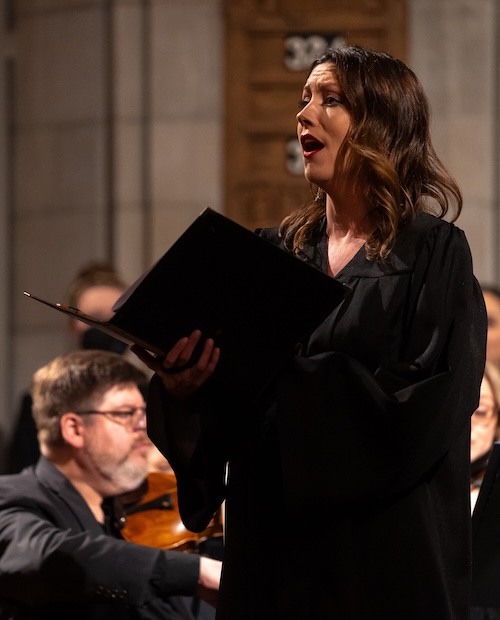Music of the Baroque wraps season in varied, spirited fashion under Quigley

Music of the Baroque began life in 1971 as a professional choir performing Baroque choral music at Chicago-area churches prized for their architectural distinction and acoustical beauty.
So the final performance of the group’s 53rd season, Monday night at a first-time venue, Fourth Presbyterian Church in downtown Chicago, represented both a rounding of the circle and a tribute to its founder, director and longtime guiding light, Thomas Wikman, who died last October.
Titled “Heaven and Earth,” the 2023-24 series finale enlisted the expert leadership of Patrick Dupre Quigley, founder and artistic director of the Miami-based choral ensemble Seraphic Fire, in his third guest appearance with MOB.
The sonic splendor of Fourth Presbyterian combined with the high-vaulted church’s ornate visual appeal to lend further distinction to an imaginative program of sacred and profane music that celebrated two great musical dramatists of the Baroque era, George Frideric Handel and Henry Purcell.
With his setting of Psalm 110, Dixit Dominus, the 22-year-old Handel gained the patronage of a number of wealthy Italian cardinals while studying in Rome. Undaunted by the task of setting a Latin text in Italian liturgical style for a Catholic Vespers service, the young German Protestant revealed not only his mastery of the style of an earlier generation of Italian sacred composers but an ability to far exceed them in sheer musical invention and bold expressivity. Dixit Dominus stands as one of the most vivid, substantial large-scale pieces of Latin church music of the early 18th century.
Quigley brought out its youthful full-bloodedness in a reading brimming with dramatic energy and harmonic surprises. He clearly knows the style inside and out and he managed to infuse the chamber choir (prepared by director Andrew Megill), chamber orchestra and chorus soloists with comparable commitment.
The church’s resonant acoustic can be tricky for choral groups to manage successfully, but MOB’s ensemble of 26 voices proved to be the right size for the sonic space: full yet clear, well-balanced, alert of rhythm, precise of pitch, fully engaged in the music and text, particularly in those sections evoking the wrath of God.
Fugal lines, notably those of the “Judicabit in nationibus” (He shall judge among nations) meshed like a finely engineered relay race. Even at the furious clip with which Quigley drove the “Gloria Patri, et Filio” chorus at the end, nary a hair was out of place.

Of the chorus soloists, Chelsea Lyons lofted her ample, velvety mezzo to exultant effect in “Virgam virtutis tuae,” while the soprano duet “De torrente in via bibet” brought a dulcet blending of voices from Katelyn Lee and Hannah Dixon McConnell. The orchestral contribution was of similar quality, save for an unfortunate early entrance by a lone string player in the opening section.
Fully staged performances of Purcell’s semi-operas—spoken dramas interspersed with musical scenes—are rare enough these days so that even excerpts, as Quigley presented here in the form of the Act 3 “Frost Scene” from King Arthur, are welcome reminders of the composer’s exceptional skill as a musical dramatist.
The scene is full of delightful strokes of Purcellian musical onomatopoeia, as witness the Cold Genius’ (bass Dominic German) mustering frozen syllables of John Dryden’s text through chattering teeth. Earlier we had the ingratiatingly plummy soprano of McConnell’s Cupid awakening that character from his icy slumber. An amusing touch in this semi-staging was having the Cold Genius and chorus members shedding their winter coats under the warming spell of love, to reveal summer shirts in Day-Glo colors underneath.
Then it was back to the heavenly heights for Gregorio Allegri’s greatest hit, his a-cappella setting of the psalm Miserere. The version performed in recent times is not really the plain and simple original but, rather, a conflation of later versions incorporating embellishments such as the high Cs for soprano voice that give the piece its ethereal effect.
Quigley and friends made the interior an integral part of the performance. The choir was divided between lofts on opposing sides of the nave, the cantorial bits were sung by chorus tenor Ryan Townsend Strand from the back of the church, and the church was darkened save for candlelight. Everything came together in an otherworldly glow of sound echoing in a sacred space.
Lest members of the fine MOB orchestra feel neglected, Quigley opened the concert with a crisply vivacious account of J.S. Bach’s First Orchestral Suite for strings, woodwinds and organ-harpsichord continuo (BWV 1066). The guest conductor saw to it that dance rhythms had proper lift and he paid particularly close attention to dynamic contrasts, thereby avoiding any hint of textural monotony. What’s more, his tempos all felt judicious, neither too brisk nor too slow, with prominent contributions from the excellent oboe pair and bassoon.
The concert will be available on demand from Friday to June 17 at baroque.org.
Music of the Baroque’s 2024-25 season opens September 15 & 17 with Haydn’s The Creation.
Posted in Performances


